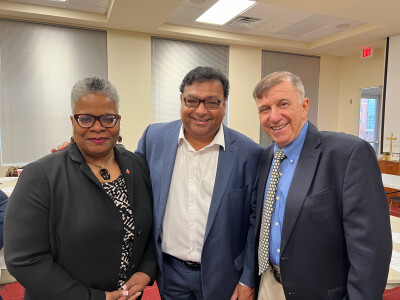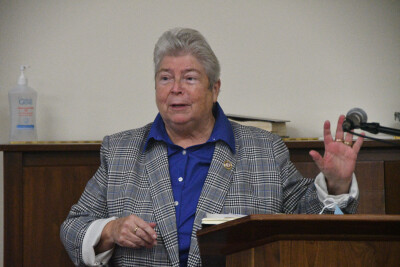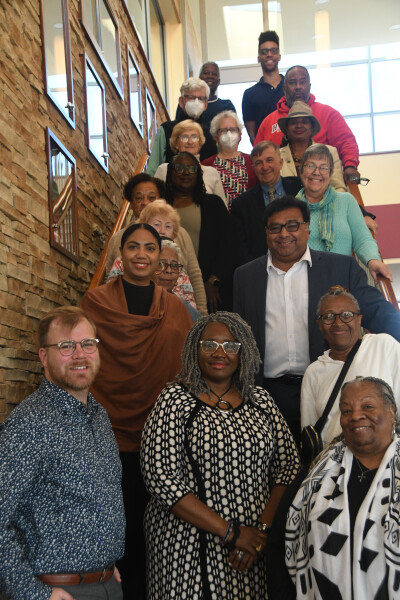Health care and gun violence top legislative priorities
By Melissa Lauber
 Jesus stood boldly in the public square and preached for justice, peace and equity. United Methodists should do no less, Bishop LaTrelle Easterling told a group gathered on Nov. 18 at the BWC Mission Center and online to explore legislative advocacy.
Jesus stood boldly in the public square and preached for justice, peace and equity. United Methodists should do no less, Bishop LaTrelle Easterling told a group gathered on Nov. 18 at the BWC Mission Center and online to explore legislative advocacy.
“People of faith are called to stand up. Peace is not just the absence of violence, it is the embodiment of equality and equity for all,” the bishop said. “Every individual should be loved, honored, and respected in the dignity of their personhood. Everybody carries within them the imago dei, the image and likeness of God. It is our call to work for real, embodied peace and justice for all.”
Several leaders from Annapolis, met with the advocates to discuss the 2024 legislative session and how United Methodists can make a difference in preventing gun violence and providing health care for all.
Maryland Delegate Bonnie L. Cullison, of Montgomery County’s District 19 and vice-chair of the Health and Government Operations Committee, predicted that this would be a frugal year for state lawmakers, but encouraged United Methodists to make their voices heard.
In particular, she said, the Health and Government Operations Committee will be working to make sure undocumented immigrants, many of whom work and pay taxes in the state, have access to Medicaid.
The committee will also be working to bring forth legislation to open overdose prevention centers and pass the end-of-life options act.
 In all their effort to affect social justice, Cullison urged people of faith to plan well. “You don’t get the right thing done just because you say it’s the right thing. You have to have the strategy to do it,” she said
In all their effort to affect social justice, Cullison urged people of faith to plan well. “You don’t get the right thing done just because you say it’s the right thing. You have to have the strategy to do it,” she said
Cullison will also be providing leadership on a proposed bill to give full authority to the state’s Prescription Affordability Board, allowing the board to set payment limits to make high-cost drugs more affordable for all Marylanders.
Vinnie DeMarco, president of the Health Care for All Coalition, praised Cullison’s work on this issue, emphasizing that skyrocketing cost are making some medicines virtually inaccessible for some Maryland residents. “Drugs don’t work if people can’t afford them,” he said.
DeMarco, an esteemed lobbyist who has worked with The United Methodist Church on several issues, asked the church to support three key initiatives when the state legislature convenes this winter.
Speak out to expand access to health insurance, he said, to pass legislation that reduces prescription drug costs, and advance health equity.
Because of the work of Health Care for All and other community-based groups, Maryland ranks as the fifth best state in the country for health care costs, access and outcomes, DeMarco said. “That work must continue.”
Those gathered at the Mission Center and via Zoom also learned about efforts to prevent gun violence in Baltimore. “The statistics are stark,” said Karen Herren, the executive director of Marylanders to Prevent Gun Violence.
 While Maryland’s gun safety laws are strong, across the state, 796 people die from gun violence and another 1,363 are wounded each year. Gun violence increased 39 percent nationwide since 2012, but the increase in Maryland has been 54 percent. “We have the ninth highest rate of gun homicides in the nation,” Herren reported.
While Maryland’s gun safety laws are strong, across the state, 796 people die from gun violence and another 1,363 are wounded each year. Gun violence increased 39 percent nationwide since 2012, but the increase in Maryland has been 54 percent. “We have the ninth highest rate of gun homicides in the nation,” Herren reported.
In addition, to the lives and communities shattered, gun violence also cost Maryland $10.5 billion per year of which $383.9 million is paid by taxpayers; about $1,731 per resident, she said.
To address this, advocates are pursuing a public health approach. In the coming years they’ll be asking legislators for the establishment of a state Office of Violence Intervention and Prevention to be paid for with a proposed tax on guns. Herren and her coalition are also calling for prevention efforts to address the needs of young people and others before they reach for guns.
Some youth seem to be choosing death over the life that is currently available to them, Herren said. “We don’t appear to be addressing how to prevent youth from picking up guns in the first place.” We’ve created a culture that’s “awash in guns and lack in hope.”
Jesus didn’t say “blessed are those who offer thoughts and prayers,” Bishop Easterling told those gathered. “He said, “blessed are the peace makers. That means we need to be doing something. We are called to be involved in the affairs of our nation, and to do it as baptized people, committed to justice and equity.”
Mark your calendars:
To help create that culture of hope and provide justice for all people, the Baltimore-Washington Conference (along with members of the Peninsula Delaware Conference) are offering three 2024 Legislative Advocacy Days:
- Maryland Legislative Advocacy Day on Feb. 21 in Annapolis
- Federal Legislative Advocacy Day on Sept. 18 in Washington, D.C., and
- D.C. Legislative Advocacy Day on Oct. 23 in Washington, D.C.

How can I get our church more involved in politics and public policy issues?